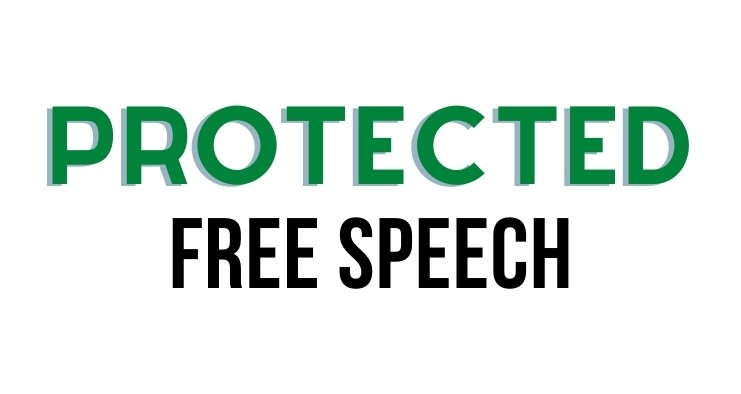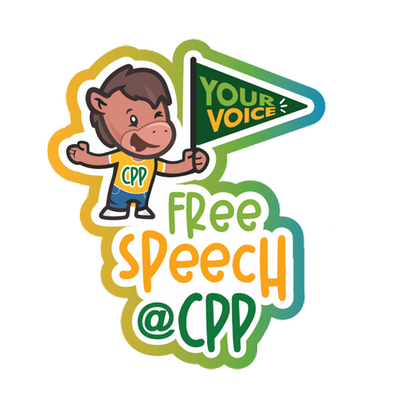Free Speech at Cal Poly Pomona

Effective September 3, 2024 - The Chancellor's Directive on Prohibited Activities for faculty, staff, and auxiliary staff is in effect.
Effective August 21, 2024 – Interim CSU Systemwide Time, Place and Manner Policy and CPP Campus Addendum in effect for students and non-represented employees.
We Are Guided by the First Amendment
Free speech is a constitutionally-established right that has been consistently upheld by the highest courts in the United States. This means the government, including a public institution such as Cal Poly Pomona, may not restrict speech, except in limited circumstances.
First Amendment - U.S. Constitution
Congress shall make no law respecting an establishment of religion, or prohibiting the free exercise thereof; or abridging the freedom of speech, or of the press; or the right of the people peaceably to assemble, and to petition the Government for a redress of grievances.
California Constitution
Every person may freely speak, write and publish his or her sentiments on all subjects, being responsible for the abuse of this right. A law may not restrain or abridge liberty of speech or press.
Free Speech Means Speech You Might Disagree With
You could encounter numerous events, activities and conversations on campus, the sentiment of which you may disagree. CPP is committed to fostering a campus environment that values and critically engages with a diversity of viewpoints — even if some expressions are controversial or even upsetting.
We also recognize the 24/7 social media and news cycle can cause information and often disinformation to spread rapidly, some of which can be upsetting. We encourage you to reach out to support resources such as Counseling and Psychological Services for students and Empathia for faculty and staff.

- Expressive activities
- Written words
- Verbal speech
- Online posts
- Gestures and Symbolic Behavior
- Flyers and handouts
- Music, dance and other art
- Clothing

- Speech that incites actual violence or harm
- Fighting words
- True threats
- Defamation
- Obscenity/Child pornography
- Severe harassment
- False advertising
- The use of public resources for partisan politics
Learn More About When Free Speech Isn't Protected
Hate Speech
As a public institution, controlling messages that may be voiced on campus would mean government interference with speech and a violation of the First Amendment.
There is no speech exception under the First Amendment, meaning most "hate speech" is as fully protected as any other form of protected speech.
There is also no legal definition for hate speech, although it is understood to mean hurtful or offensive speech targeted towards a certain person or group.
No one has a right not to be offended by speech.
Understanding Free Speech Activities
Yes, public universities like Cal Poly Pomona are government entities that are bound by the U.S. Constitution; individuals on public campuses have free speech rights protected by the First Amendment.
For free speech and expressive activities, the California State University and Cal Poly Pomona has rules and guidelines regarding time, place and manner (i.e., when, where, and how speech may occur).
These guidelines help ensure that campus community members can safely engage in protests, rallies and other expressiveevents, while also ensuring that scheduled events and university operations (classes, final exams, etc.) are not materially disrupted and that the conduct/speech does not involve substantial disorder or invasion of the rights of others.
Yes, to a point. Public colleges like Cal Poly Pomona are allowed to maintain reasonable time, place and manner restrictions. They can have viewpoint-neutral rules on where, when, and how individuals can demonstrate on campus in order to prevent disruption of the educational environment.
The California State University Interim Systemwide Time, Place and Manner Policy regulates some activities associated with protests including prohibiting camping, overnight demonstrations, and barriers. Members of campus planning or participating in a protest should review these regulations as well as Cal Poly Pomona’s Time Place and Manner Campus Addendum.
Things to Note
- Latitude must be provided for speakers from every spectrum, in both formal and informal settings.
- There can be no viewpoint discrimination or censorship.
- All speakers/groups must be treated equally in terms of conditions of access.
Cal Poly Pomona can only restrict speech based on content when it reasonably appears the speaker will advocate:
- Violent overthrow of the government.
- Willful destruction or seizure of campus buildings or property.
- Disruption of classes or educational functions.
- Physical harm or intimidation of campus officials, faculty, or students.
- Other campus disorder of a violent nature.
Yes. Students do not give up their free speech rights while in school.
Things to Note:
- Student speech while in class may be limited.
- Students do not have the right to insist that a class be viewpoint neutral.
- Students may not engage in conduct or speech that materially disrupts class work or involves substantial disorder or invasion of the rights of others.
Yes. Faculty/Staff are entitled to academic freedom.
This allows professors to exercise their professional judgment in teaching and research. It is not unrestricted free speech rights.
Some speech may exceed the protections provided under the First Amendment and academic freedom. These limitations include:
- Verbal abuse of students.
- Discussion of political/social topics unrelated to the subject matter.
- Defamation.
- Verbal or physical harassment of students.
Under the First Amendment, an individual can't be censored or punished for their opinion. This means that individuals on campus have the right to express even the most controversial viewpoints.
There are some exceptions however, such as threatening to harm another person or inciting imminent violence or destruction of property, that can have disciplinary consequences.
- Traditional Public Forum - Highest Protection
- Streets, sidewalks, and parks where expressive rights receive the highest level of protection. Subject to reasonable time, place, and manner regulations. Restrictions cannot be content-based.
- Designated Public Form - High Protection
- Auditoriums, sporting venues, social media, message boards, etc. Public maintains the same expressive rights they would have in a traditional public forum, as long as the forum remains open (but the government can close the forum).
- Limited Public Forum - Less Protection
- A designated public forum that has been restricted by the government to a particular subject matter or class of speaker.
- Government can prevent use by persons not qualifying and prevent expression of. matters not related to the topic, but cannot bar expression simply out of disagreement with the message.
- Examples: Student meeting rooms, social media dedicated to a topic.
- Non-Public Forum - Lowest Protection
- Government business offices, Courts.
Yes. The Bronco Leadership Center (BLC) oversees the posting of posters, flyers, banners and signs. They must obtain a stamp from the BLC, which must be placed on the flyer, indicating that they have met the CPP Campus Addendum to the CSU Interim Time, Place and Manner policy.
Please note that University Housing Services, which operates the residence halls located on campus, has its own posting policy.
